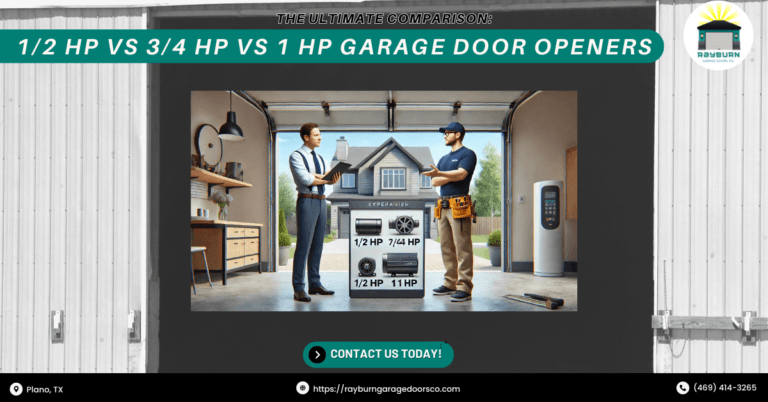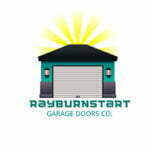The Ultimate Comparison: 1/2 HP vs 3/4 HP vs 1 HP Garage Door Openers
Struggling to pick the right garage door opener? Find out if 1/2 HP, 3/4 HP, or 1 HP is your best match. Rayburn Garage Doors Co. offers fast repairs in Plano, TX.
Is Your Garage Door Opener Up to the Task? Here’s How to Know
If you’re dealing with garage door opener issues or planning a new garage door installation, choosing the right motor strength is essential. You might wonder, “Is my opener powerful enough for my door, or do I need to upgrade?”
At Rayburn Garage Doors Co., we often get calls from Plano residents with this exact question. Whether you’re upgrading your system, handling garage door repair in Plano, TX, or looking for emergency garage door repair, understanding the differences between 1/2 HP, 3/4 HP, and 1 HP openers can save you time, money, and headaches.
Let’s walk through each type and find out which one is right for your garage door.

Is 1/2 HP Enough? The Best Choice for Small Garage Doors
If your home has a single-car garage with a standard sectional door, the 1/2 HP opener might be all you need. This motor works best for doors that are lightweight and used only a few times per day. Think aluminum or fiberglass doors that don’t carry much weight.
When to Choose a 1/2 HP Opener:
- Door Size: 8-10 feet wide, up to 7 feet tall
- Material: Lightweight aluminum or fiberglass
- Use Case: Light daily use
- Best For: Small, single-car garages
Pro Tip: If your 1/2 HP opener is straining to lift the door or seems slow, it’s a sign you may need garage door opener repair or even an upgrade. A struggling opener can also wear out your springs, leading to the need for garage door spring repair.
Why 3/4 HP is the Goldilocks Choice for Most Homes
For many homeowners, the 3/4 HP opener is the perfect balance of power and efficiency. If you have a two-car garage with a heavier steel or insulated door, this motor offers reliability without overkill. In fact, most residential garage door repairs we handle involve this type of opener—it’s popular for a reason.
Why Choose a 3/4 HP Opener:
- Door Size: Up to 16 feet wide, 7-8 feet tall
- Material: Insulated steel, wood composite, or mid-weight materials
- Use Case: Moderate to heavy daily use
- Best For: Two-car garages or slightly larger doors
This motor not only performs well but also reduces the strain on the door’s mechanical parts, lowering the chances of needing garage door opener repair in the future.
When 1 HP is Your Best Bet: Power for Heavy or Oversized Doors
If your garage door is oversized, solid wood, or extra insulated, you’ll need the heavy lifting power of a 1 HP opener. These openers are also a must for commercial garage door repair in high-traffic spaces around Plano, TX, such as The Shops at Legacy or Legacy West. They handle frequent use without breaking a sweat.
When to Go with a 1 HP Opener:
- Door Size: Extra-wide or extra-tall (over 16 feet)
- Material: Solid wood or heavy insulation
- Use Case: High-traffic areas or commercial use
- Best For: Large residential garages, RV doors, or commercial spaces
1 HP openers can power through even the most stubborn doors, minimizing the need for emergency garage door repair down the road.
Comparison Table: Which Garage Door Opener is Right for You?
HP Rating | Door Size | Door Material | Use Case | Best For |
1/2 HP | 8-10 ft | Aluminum, Fiberglass | Light use | Single-car garages |
3/4 HP | Up to 16 ft | Insulated Steel, Composite | Moderate use | Two-car garages |
1 HP | 16+ ft | Solid Wood, Heavy Insulation | Heavy use | RV doors, Commercial spaces |
What If You Choose the Wrong Opener?
Installing an underpowered motor can wear out fast, leading to garage door opener repair sooner than expected. It may also place extra strain on your garage door springs, requiring garage door spring repair. On the other hand, an overpowered opener can be noisy and more expensive than necessary for a small door.
FAQ: Your Top Garage Door Opener Questions Answered
Q: How do I know if my opener needs replacing?
If your door is slow to open, makes loud noises, or needs manual assistance, it may be time to upgrade—or call us for garage door repair in Plano, TX.
Q: Can I upgrade from 1/2 HP to 3/4 HP without changing my whole system?
Yes! Most motors are compatible with existing tracks and hardware. We can help you upgrade seamlessly with residential garage door repair services.
Q: How long do openers typically last?
With proper maintenance, garage door openers last about 10-15 years. If yours is older or making strange noises, contact us for an inspection or garage door opener repair.
Final Thoughts: Get the Opener That Fits Your Door Perfectly
Choosing the right garage door opener is all about matching the motor’s power to your door’s size and weight. A 1/2 HP opener works great for small, lightweight doors, while 3/4 HP openers suit most two-car garages. If you’re working with a heavy, oversized door—or need commercial garage door repair—a 1 HP opener is the safest bet.
When in doubt, trust the experts! At Rayburn Garage Doors Co., we’ve spent years providing garage door repair in Plano, TX, and we know exactly what your garage needs. We’ve helped homeowners near Arbor Hills Nature Preserve and businesses by Heritage Farmstead Museum keep their doors in top shape.
Call Rayburn Garage Doors Co. Today!
If your opener isn’t performing the way it should—or if you’re ready for an upgrade—reach out to us for a consultation. We specialize in everything from residential garage door repair to full garage door installation. Need help fast? We also offer emergency garage door repair services to keep your day running smoothly.
Get in touch today! Let’s make sure your door is powered by the right opener, so it works perfectly—every time.
Have questions or need immediate help? Call Rayburn Garage Doors Co. and let our experts assist you. We’re always ready to serve you, whether you’re in Legacy West, Downtown Plano, or nearby neighborhoods.
What’s Your Current Garage Door Opener?
Take a second to comment below—are you using 1/2 HP, 3/4 HP, or 1 HP? Tell us about your experience!
